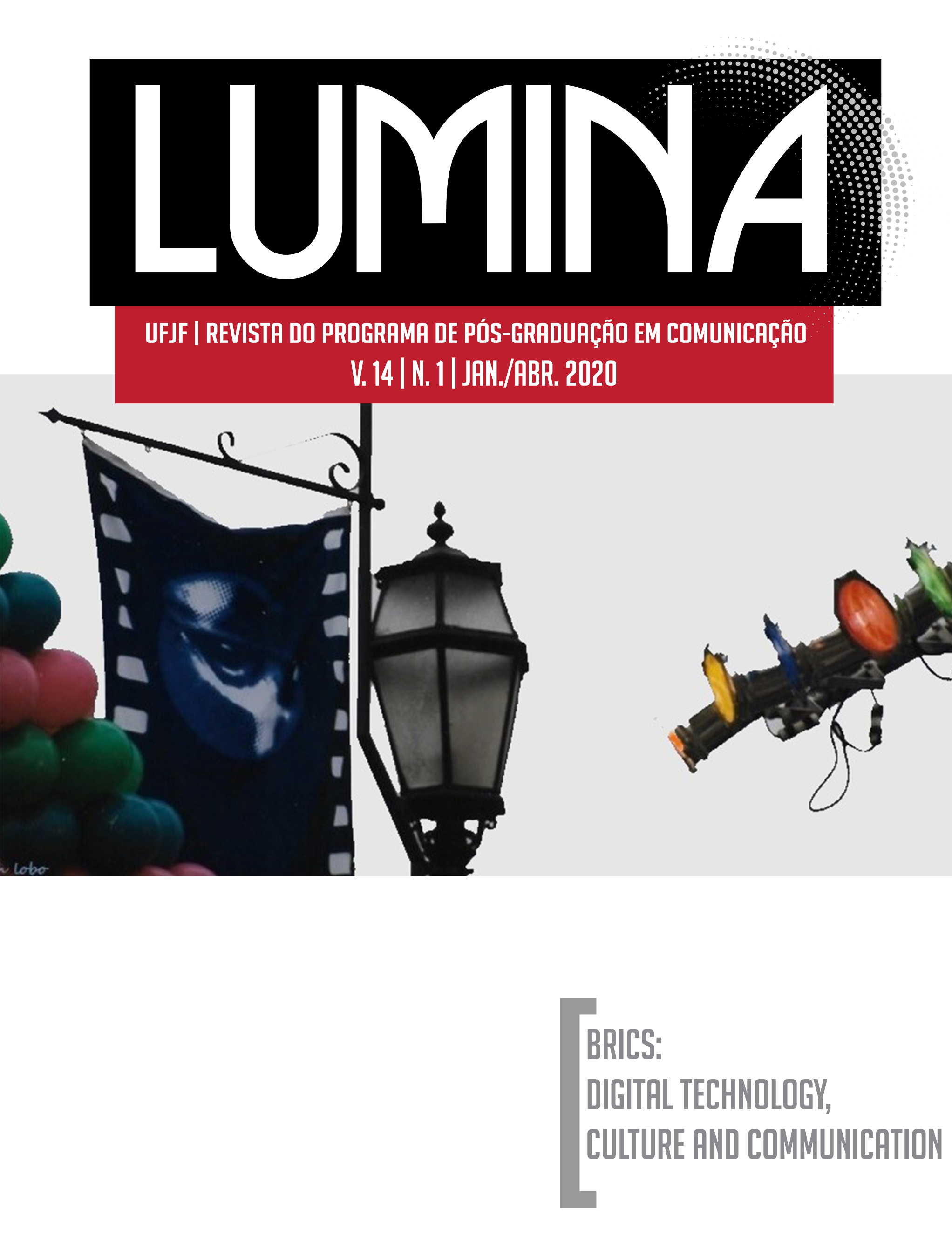Media Evolution, “Double-edged Sword” Technology and Active Spectatorship: investigating “Desktop Film” from media ecology perspective
DOI:
https://doi.org/10.34019/1981-4070.2020.v14.30260Palavras-chave:
Desktop Film, Media Ecology, Evolution, Technology, SpectatorshipResumo
Desktop film or computer screen film is a film subgenre with all events and actions taking place on a screen of a computer and using the protagonist’s first-person perspective, exemplified by The Den (2013), Open Windows(2014), Unfriended (2014), Unfriended: Dark Web (2018), Profile (2018) and Searching(2018). This paper mainly focuses on the desktop films with the theoretical framework of “Media Ecology”, aiming to investigate how the desktop film evolves and interacts with new media, digital technology, while influencing communication and spectatorship. Firstly, this paper discusses the evolution of cinema, which evolves through the interaction, co-existence and convergence with other media, as well as corresponds to the anthropotropic trend. Secondly, this paper investigates the digital media and technology in desktop films. “Desktop films” create cyberspaces and reproduce people’s virtual lives, revealing the influences of media technology, which is considered as a double-edged sword. Thirdly, this paper analyzes how desktop film exerts impacts on cinematic communication, while reshaping the spectatorship and audience’s viewing mechanism. “Desktop films” are suitable to be watched on computer, thus making audiences become active and have more autonomy.
Downloads
Metrics
Referências
BAUDRILLARD, J. Simulacra and Simulation. Michigan: University of Michigan Press, 1995.
BAUDRY, J. L.; WILLIAMS, A. Ideological Effects of the Basic Cinematographic Apparatus. Film Quarterly, v. 28, n.2, p. 39-47, 1974. Disponível: < https://fq.ucpress.edu/content/28/2/39>. Acesso em: 15 abr. 2020.
BAZIN, A. What Is Cinema. Berkeley: University of California Press, 1967.
BEKMAMBETOV, T. Rules of the Screenmovie: The Unfriended Manifesto for the Digital Age. Movie Maker, Online, 2015. <https://www.moviemaker.com/unfriended-rules-of-the-screenmovie-a-manifesto-for-the-digital-age/>
FRIEDBERG, A. The Virtual Window: From Alberti to Microsoft. Cambridge: MIT Press, 2006.
HARVEY, D. The Condition of Postmodernity: An Enquiry into the Origins of Cultural Change. Oxford: Blackwell Publishers, 1989.
LEVINSON, P. Digital McLuhan: A Guide to the Information Millennium. Londres: Routledge, 2001.
LEVINSON, P. Cellphone: The Story of the World's Most Mobile Medium and How It Has Transformed Everything! Londres: Palgrave/St. Martins, 2004.
DENSON, S.; LEYDA, J. (eds.). Post-Cinema: Theorizing 21st-Century Film. Falmer: Reframe Books, 2016.
MCLUHAN, M.; FIORE, Q. The Medium Is the Massage: An Inventory of Effects, Nova York: Touchstone, 1989.
MCLUHAN, M.; LAPHAM, L. H. Understanding Media: The Extensions of Man. Cambridge: MIT Press, 1994.
POSTMAN, N. The Reformed English Curriculum. EURICH, A. C (ed.) High School 1980: The Shape of the Future in American Secondary Education. Nova York: Pitman, 1970, p. 160-168.
POSTMAN, N. Amusing Ourselves to Death: Public Discourse in the Age of Show Business. Nova York: Penguin, 1985.
POSTMAN, N. The End of the Education: Redefining of the Value of School. Nova York: Alfred A. Knopf, 1996.
POSTMAN, N. The Humanism of Media Ecology. Proceedings of the Media Ecology Association, v.1, p.10-16, 2010. Disponível em: < https://www.media-ecology.org/resources/Documents/Proceedings/v1/v1-02-Postman.pdf>. Acesso em: 15 abr.
SHAO, P. The Five Revolutions in the History of Human Communication. China Radio & TV Academic Journal, v. 7, p. 5-8, 1996. Disponível em: < https://bit.ly/3coJ27U>. Acesso em: 15 abr. 2020.
ZHANG, J. From Cinema to Computer: Desktop Movies Change the Ways of Viewing. Contemporary Cinema, v. 6, p. 34-39, 2019.
Downloads
Publicado
Como Citar
Edição
Seção
Licença
Autores que publicam nesta revista concordam com os seguintes termos:
- Autores mantém os direitos autorais e concedem à revista o direito de primeira publicação, com o trabalho simultaneamente licenciado sob a Licença Creative Commons Attribution que permite o compartilhamento do trabalho com reconhecimento da autoria e publicação inicial nesta revista.
- Autores têm autorização para assumir contratos adicionais separadamente, para distribuição não-exclusiva da versão do trabalho publicada nesta revista (ex.: publicar em repositório institucional ou como capítulo de livro), com reconhecimento de autoria e publicação inicial nesta revista.
- Autores têm permissão e são estimulados a publicar e distribuir seu trabalho online (ex.: em repositórios institucionais ou na sua página pessoal) a qualquer ponto antes ou durante o processo editorial, já que isso pode gerar alterações produtivas, bem como aumentar o impacto e a citação do trabalho publicado (Veja O Efeito do Acesso Livre).





